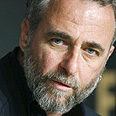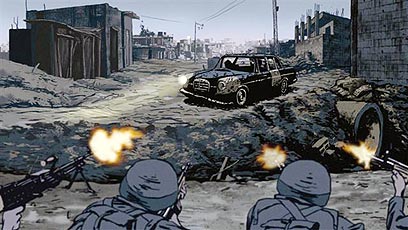
The president of the jury was Israeli director Dror Shaul whose movie, "Adama Meshuga'at" ("Sweet Mud") received the main prize in last year’s competition.
The jury included Martina Bleis, a representative of the Berlinale Production Market, Srđan Vuletić, a director from Bosnia and Herzegovina, Lena Bogdanović, a Serbian actress and Romanian actress Maria Popistasu.
Eleven movies competed in this year’s contest, including “Lemon Tree” directed by Eran Riklis.
In explaining their choice for the Golden Tower given to Folman’s film the judges said, “For the fresh, courageous and, above all, honest approach to complex subject matters such as coming to terms with ‘historical stains’ in both national and individual memories. With this film, Ari Folman is redefining film language. This is author’s cinema at its best.”
Dror Shaul, who presented the prize to the winning movie, told Ynet, “’Waltz with Bashir’ is a masterpiece in my eyes. One of the best Israeli films to date. Ari deserves this prize as a great creator and a wonderful person.
“As an Israeli and as director of the jury, it was my privilege to speak last and I was pleased that at that point, the judges were in favor of the movie.”

‘Waltz with Bashir’ (Illustration: David Polonsky)
Aside from the official competition, the festival dedicated time to a special spotlight on Israeli film, that included amongst other films, screenings of “The Band’s Visit” by Eran Kolirin, the “Lemon Tree” by Eran Riklis,”Beaufort” by Joseph Cedar, “The Debt” by Assaf Bernstein, “Noodle” by Ayelet Menahemi and “Vasermil” by Mushon Salmona.
In addition, as part of the gesture, a number of short films directed by graduates of the Sam Spiegel Film and Television school in Jerusalem, were screened as well.
'10 levels above the rest of the movies'
“It’s funny, I went to Palić because of my great interest in European theater and because I thought that this is a wonderful platform for meetings with European producers and it is unpleasant to say, but the Israel films were at the center of the festival.“In all modesty, I have to say, they were 10 levels above the rest of the movies screened. There is no doubt that Israeli cinema is at a meteoric leap in relation to what is going on in Europe. This is definitely delightful,” said Shaul.
The European Film Festival in Palić made it its goal to fight against the growing cultural imperialism apparent in the age of globalization.
“We believe that entertainment and consumerism are not the general authentic signs of this period and that social and moral order have not entirely lost their ability to radically influence,” said one of the festival’s directors.
“We believe that exposing the relationship between the real and the possible, art can contribute to the existence of a more humane world. We believe that art is not for sale and that there are values which are not relative,” said one of the directors.















